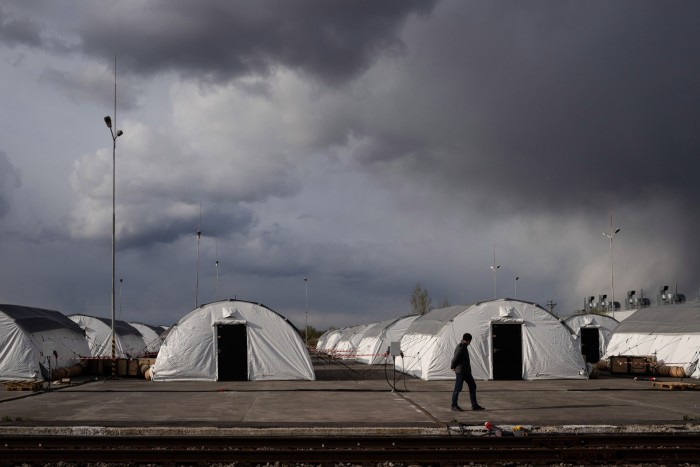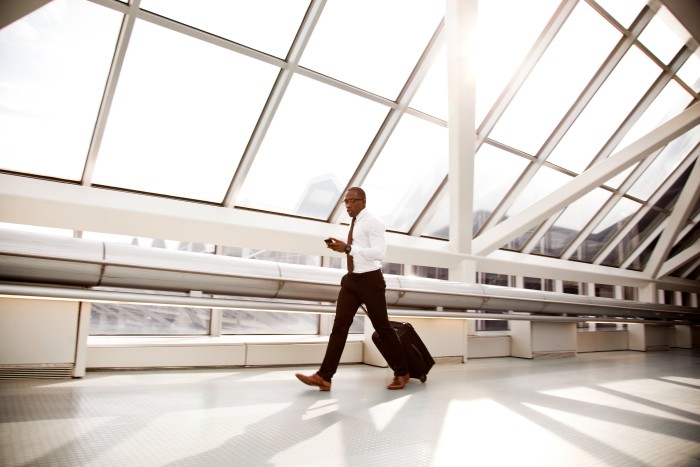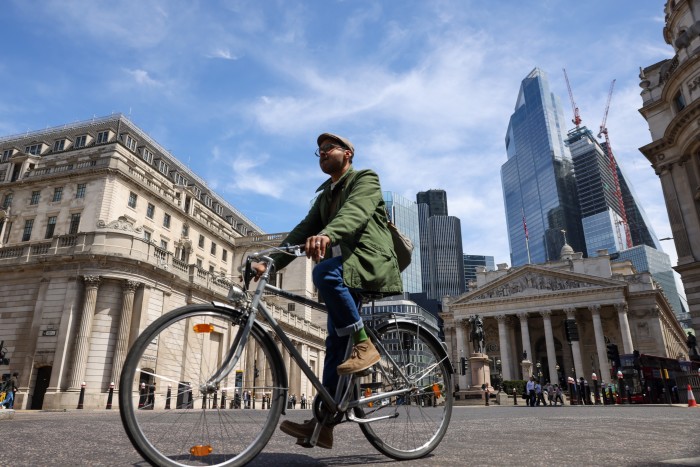Law firms hold leaders to account on green claims

Roula Khalaf, Editor of the FT, selects her favourite stories in this weekly newsletter.
Alexander Rhodes, head of the sustainability arm of Mishcon de Reya, the City of London law firm, draws a bell curve in the air and points either side of the peak.
Most companies are making good progress on sustainability goals such as emissions reduction, he says, but some are at the extremes: either leading the way, or lagging behind.
At Mishcon Purpose, a team of lawyers and experts in environmental, social and governance (ESG) matters advise those leading groups on developing sustainability strategies, but bring litigation against the poorest performers.
The unit represents groups of individuals or small businesses in climate-related claims and other environmental problems, such as being affected by toxic waste. “It’s about increasing access to justice and having a wider systemic impact beyond just recompense [payment] for the claim,” explains Rhodes.
But corporate law firms, generally, also say they can play a role in reducing the impact of climate change, by nudging companies and governments to act — and challenging them on living up to their climate pledges.
Historically, the biggest firms have been reluctant to become involved in public action on green issues. However, the number of climate litigation cases has doubled globally since 2015, according to the Grantham Research Institute at the London School of Economics.
Many of the companies targeted are in the fossil fuel, plastics, transport or finance sectors, with claims addressing allegations of greenwashing and contributions — direct or indirect — to climate change. There have also been more than 70 “framework cases” that challenge governments’ responses to climate change.
Financing these cases can be difficult. Before taking on a case, law firms must decide who will pay to take on governments and heavily polluting companies. Funding from legal aid and philanthropic groups is finite and pursuing litigation on behalf of groups of victims can be costly.
“If you just try to do this kind of litigation on a pro bono bit of the business, or on an ad hoc basis, you’re never really going to be able to tuck in and focus and drive the kind of systemic impact we’d like to see,” says Rhodes.
Last year, Mishcon and Harbour Litigation, one of the world’s largest third-party funders, created a £150mn litigation fund that lets investors hedge against the risk of failure. It has financed several cases, including some led by Mishcon Purpose. Many law firms already use investors to finance no-win no-fee cases — although, with that type of litigation, there is a risk of hefty losses if it fails. A fund can spread the risk of this happening.
Law firms Willkie Farr & Gallagher and DLA Piper have also struck agreements with litigation funders, and Aristata Capital, a litigation funder focused exclusively on ESG matters, raised £40mn in July.
Industry collaborations have proliferated since the Paris climate agreement in 2015. They include the Net Zero Lawyers Alliance, Pinsent Masons’ One Million Hours project and the UK-based Legal Sustainability Alliance.
In addition, non-profit bodies have built multiple strategic litigation cases against company boards and individual directors for alleged breaches of fiduciary duty, including a failure to consider climate risks.
ClientEarth, for instance, is exploring the potential of applying consumer and advertising law in greenwashing cases, says Sophie Marjanac, who heads the corporate law project at the non-profit organisation.
Law firms are also looking to quantify their own climate impact, while some campaigners suggest that firms should reconsider their choice of client.
Everyone has an opportunity to make a positive impact, says Marjanac, who joined ClientEarth from the corporate law sector. But, she argues: “Law firms need to think about whether they continue to serve high emissions clients, and work with clients to develop transition plans”.
Sonali Siriwardena quit her job as head of sustainability regulation and policy at Morgan Stanley Investment Management this year, and is now a partner and global head of ESG at UK law firm Simmons & Simmons. A lawyer and a kitesurfing enthusiast, she felt she could do more for sustainability — in particular, protecting the oceans — by helping the financial sector deal with complex rules on biodiversity and emissions.
“I realised that, with the tsunami of ESG regulation coming through, there was an opportunity for law firms to be more nimble in translating what these new laws really mean for companies,” she says.
The firm does not have a bar on companies that are high emitters or heavy polluters. And the right to counsel is a “fundamental principle”, Siriwardena says. “But that does not mean, as a law firm, that you should not have a house view on what type of clients you choose to represent,” she adds.
Ultimately, even the cases that climate campaigners do not win can highlight gaps in the law and spur parliamentarians into reforms, says Jeff Twentyman, head of sustainability at Slaughter and May.
Law firms should not refuse to represent clients who move slowly, he says: “You cannot shift the economy faster than it is shifting itself.”
Case studies in best practice
Researched, compiled and ranked by RSGI. ‘Winner’ indicates the organisation won an FT Innovative Lawyers 2022 award.
Responsible business
Winner: Travers Smith
Originality: 8 Leadership: 10 Impact: 8 — Total 26
The Domestic Abuse Response Alliance provides fast legal representation free of charge to secure injunctions for the “missing middle” of London-based domestic abuse victims: those who do not qualify for legal aid, but who still cannot afford representation. After the number of at-risk individuals rose during the pandemic, the firm brought together 250 lawyers from seven firms to help clients from the National Centre for Domestic Violence access emergency protection.
Commended: Sam Cottman
Standout
Hogan Lovells
O: 8 L: 9 I: 8 — Total 25
Provided a task force to help refugees after the withdrawal of western forces from Afghanistan in 2021. The lawyers gave pro bono support and managed visa documentation. They delivered solutions such as establishing new escape routes and helped families to settle in destination counties. The firm supported activist Shannon Galpin to assist more than 200 cyclists from the Afghan Women’s Cycling Team to leave the country.

DLA Piper
O: 7 L: 8 I: 9 — Total 24
The firm is helping displaced people in several regions. Efforts include creating a UK platform to help displaced Afghans access legal information and immigration lawyers; offering a family reunion clinic for Afghan refugees not eligible for legal aid; and collaborating with legal tech provider Legal Connection and a digital consultancy, AND Digital, to develop a website and secure chat service to provide legal advice to displaced Ukrainians.
Linklaters
O: 8 L: 8 I: 7 — Total 23
A ruling in 2017 by Kenya’s Supreme Court that mandatory capital punishment for murder is unconstitutional required the resentencing of thousands of prisoners. The law firm partnered with Reprieve, a human rights group, and Lineal, a legal tech provider, to adapt Relativity, an e-discovery tool, to support the process.
The tool builds and manages case files, and prioritises these for review by lawyers, who continue to provide legal analysis and other support.
Commended
Aequo
O: 7 L: 6 I: 7 — Total 20
The Ukrainian Global University provides funded short courses and degree programmes to Ukrainian students abroad, to help with rebuilding the country after the war. The lawyers devised a contractual arrangement to accommodate cross-border interests.
Baker McKenzie
O: 5 L: 8 I: 7 — Total 20
Lawyers partnered Global Rights for Women and Every Woman Treaty — two international non-profit organisations — plus corporate volunteers to develop a web-based analysis and comparison of domestic violence laws in 88 countries.
Deloitte Legal
O: 7 L: 5 I: 8 — Total 20
After the Russian invasion of Ukraine, the firm helped client Eurocar, an automaking plant, to become a humanitarian logistics hub in order to receive and process aid.

Sidley Austin
O: 6 L: 7 I: 7 — Total 20
Through its Emerging Enterprises pro bono programme, the firm supported a female entrepreneurship initiative, SheTrades, with training activities, and advised on the financing of OnePower, which raised $9.5mn to build solar mini-grids in Lesotho.
Uría Menéndez Abogados
O: 7 L: 5 I: 8 — Total 20
The lawyers represented Cáritas Española, the Catholic charity, before the Supreme Court of Spain, which found that registration requirements for children from Morocco to access healthcare and education in the autonomous Spanish city of Melilla in north Africa infringed their human rights.
Dentons
O: 5 L: 6 I: 8 — Total 19
The firm mobilised a mass effort in response to the war in Ukraine, including evacuation support, pro bono assistance to non-governmental organisations, and raising more than €450,000 to provide humanitarian aid.
Ellex
O: 6 L: 6 I: 7 — Total 19
The lawyers are helping Estonia-based telemedicine platform Viveo Health provide Ukrainians with free online medical consultations from volunteers around the world. More than 3,000 patients have been assisted.
Sustainable business of law
Winner: Pinsent Masons
Originality: 8 Leadership: 8 Impact: 7 — Total 23
The firm’s climate and sustainability group has developed a detailed plan for reaching its net zero carbon objectives by 2040, including cuts to energy use at its London offices at times of peak demand on the grid. The firm has created dashboards that allow individuals to track their own carbon emissions relating to business travel and it plans to introduce business travel carbon budgets in 2023.
It also helped to spearhead the One Million Hours pledge, which seeks to pool time across the legal sector to support projects tackling climate change and reducing biodiversity loss.

Standout
DLA Piper
O: 8 L: 8 I: 6 — Total 22
DLA Piper is one of the first law firms to sign a pioneering agreement to buy electricity from a UK solar farm which, from next year, will deliver green energy across its network of 15 European offices. The firm has also introduced a scheme that encourages businesses in its supply chain to use renewable energy.
Commended: Natasha Luther-Jones
DWF
L: 8 I: 7 — Total 22
The firm has set mandatory environmental, social and governance (ESG) objectives, tied to performance reviews for all its people, while executive directors on the board have financial targets relating to ESG. The firm has introduced a screening process for new and existing clients based on ESG criteria to ensure they avoid reputational risk to the firm and to identify where the firm might be able to advise on sustainability matters. DWF has also rolled out a certified course for staff on mitigating environmental impacts and a “carbon calculator tool” is being piloted to help with employee engagement with ESG targets. The firm is now subsidising staff purchases of electric
vehicles.

Garrigues
O: 7 L: 7 I: 6 — Total 20
The Spanish firm rolled out ESG training on best practice to ensure lawyers are prepared for answering client questions, including the use of a video game as part of the format. Some 700 people have attended training webinars and 250 have completed enough training to reach the firm’s accreditation of “ESG ambassador” to the organisation.
Commended
Ashurst
O: 6 L: 7 I: 6 — Total 19
The firm’s sustainability task forces, led by global ESG and sustainability partner Anna-Marie Slot, have developed a wide range of goals. The company targets significant reductions in paper, energy and water use and has been certified as carbon neutral since 2020 following the introduction of offset programmes. It has implemented a policy that screens for ESG considerations when engaging with new clients and at the start of work on new projects.
Shoosmiths
O: 6 L: 7 I: 6 — Total 19
The firm, led by chair Peter Duff, plans to reach net zero carbon status by 2025 and is treating carbon offsetting as a last resort, preferring to implement direct policies to reduce emissions by minimising the use of business flights taken by staff. The firm has held roundtables on sustainability for clients and the broader legal industry.
TLT
O: 6 L: 7 I: 6 — Total 19
The sustainability team launched its ESG strategy in 2021, focusing on more sustainable purchasing practices, greener travel, and encouraging volunteering efforts across local offices. Initiatives include a cycle-to-work scheme, renting electric cars for employees and encouraging people to work from home to reduce carbon emissions.

Comments